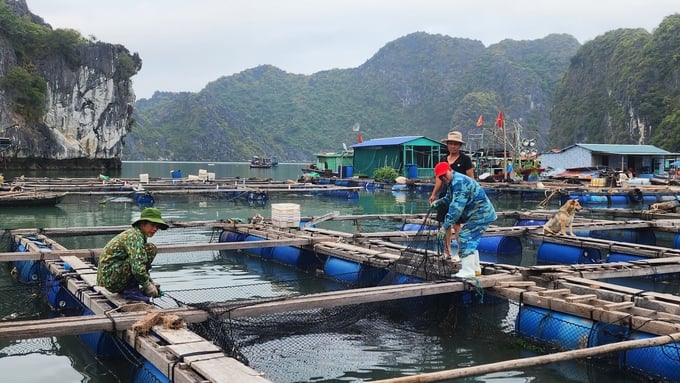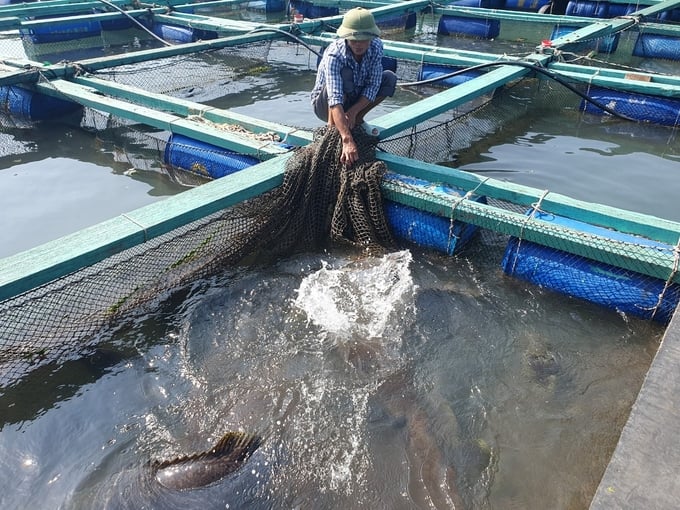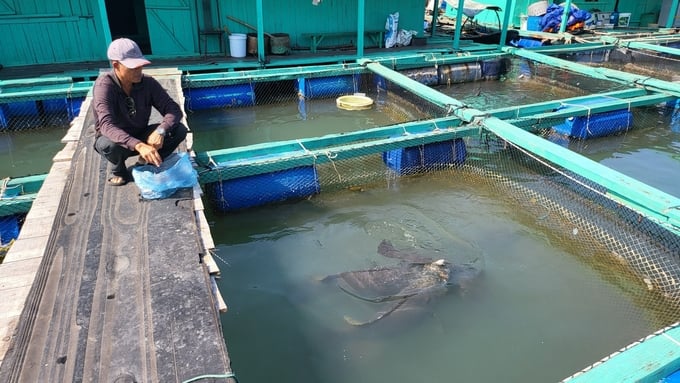November 27, 2025 | 12:15 GMT +7
November 27, 2025 | 12:15 GMT +7
Hotline: 0913.378.918
November 27, 2025 | 12:15 GMT +7
Hotline: 0913.378.918

Chinese traders no longer hustle to buy grouper in Cat Ba. Photo: Dinh Muoi.
The most basic and important difference between "unofficial quota" and "official quota" lies in the form of import and customs clearance location, usually secondary border gates, market pairs or border openings of Chinese partners.
Trade through unofficial channels will help Chinese businesses take advantage of tax exemptions and quality control is quite lax, so in recent years, "Unofficial quota" is often chosen by businesses on both sides of the border to import many types of agricultural products. However, exporting through "Unofficial quota" routes is gradually no longer suitable for the Chinese market as it faces many risks.
Recorded in Cat Ba, where seafood trading activities with Chinese traders are often the busiest in Hai Phong. If at the beginning of 2023, Chinese traders came to the rafts to buy grouper at extremely high prices, with no quantity limit, people did not have enough fish to sell, now, near the end of the year, business was gloomy and fish prices dropped.
According to research, the cause of this situation is largely due to Chinese traders stopping buying fish, in addition, recently, the amount of grouper in other localities in the country has begun to increase. These two factors have brought the price of grouper to a much lower level than at the beginning of the year, making trading more difficult.
Mr Dinh Nhu Dang, a household with 150 fish cages in Ben Beo shared: “At the beginning of the year, Chinese traders bought a lot, the price was high, some days they sold fish for up to VND 300,000/ kg and they buy up to several dozen tons of fish in a day. Nowadays, they no longer purchase at a high price like that, the price of grouper we only sell is about VND 230-250 thousand/1 kg".

In Cat Ba, there are currently about 600 tons of grouper fish left. Photo: Dinh Muoi.
Unlike Mr Dang's case, Mr Bui Van Luyen's family is currently the household raising the most king grouper in Cat Ba with about 200 fish. Weight ranges from 40-100 kg/fish, the total value is up to tens of billions of VND.According to Mr Luyen, the price of king grouper 5-10 years ago was VND 2 million/kg, which was a normal price. By the time of the COVID-19 epidemic, output was blocked, and fish prices dropped to only VND 500 thousand/kg. Currently, the price has gradually increased again but is only at about VND 1 million/kg.
The customers that king grouper targets are those who can afford it or export it abroad, mainly aiming for China because the price is expensive and few people know about it. Previously, 3-4 fish were sold each month, but now this has nearly stopped completely due to the decrease in demand for grouper fish from China, affecting the consumption of king grouper.
“In China, they only eat seasonally, so when the tourist season ends, demand also decreases. At current prices, fish growers also make a profit but not as much as at the beginning of the year. Raising king grouper is very labour-intensive, and fish food must always be fresh. Every day, king grouper must eat up to three or four meals. It takes a lot of capital to raise this type of fish", Mr Luyen shared.
Continuing to record in the Do Son district and Dai Hop commune area, many traders specializing in purchasing seafood for export to China also said that, bringing seafood into China in the form of exchange between border residents is no longer consistent with the trend of developing high-quality trade, due to increasingly strict requirements.

Mr Bui Van Luyen's school of king grouper fish is worth up to tens of billions of VND. Photo: Dinh Muoi.
" 'Unofficial quota' goods are often cleared at secondary border gates, trails, and border openings, so when unusual situations arise such as epidemics, increased border control..., these locations are often temporarily suspended, causing goods to be congested, many shipments are forced to be abandoned or liquidated at low prices", shared Ms Nguyen Thi Mai, a small wholesaler for purchasing seafood exported to China in Dai Hop commune, Kien Thuy district.
In fact, in addition to exporting grouper through unofficial channels, a series of other seafood products in Hai Phong have still been exported to China through unofficial channels for many years in large numbers. The advantage of exporting via unofficial channels is that it is not strict on quality and the procedures are somewhat lax.Therefore, if we want to export seafood sustainably, businesses need to strictly implement management mechanisms and policies on quality standards, disease testing, food safety and hygiene, traceability, import and export business registration, and inspection of growing areas, factories,... for goods in general and export goods in particular.
Translated by Hoang Duy

(VAN) China’s cooking oil is suddenly flooding into India. It all comes down to a soybean surplus that Beijing doesn’t quite know what to do with.

(VAN) An Giang promotes supply-demand connections, standardizes quality and builds value chains, creating a foundation for sustainable bird’s nest development and aiming to expand exports.
/2025/11/24/5339-4-nongnghiep-075331.jpg)
(VAN) Recently, the conference on 'Sustainable Fisheries Linkage Chain - Tilapia for Export' took place in Tien Hai commune, Hung Yen province.
/2025/11/21/4309-2-153400_128.jpg)
(VAN) Green and low-emission rice is paving the way for Vietnamese rice to enter high-end markets, marking the beginning of a transformation journey toward greening and elevating the national rice brand.

(VAN) ‘Right to Win’ outlines a national action plan that shapes a new vision for Viet Nam’s agriculture in an era of renewal and global integration.

(VAN) Lam Dong’s farmed sturgeon output this year is expected to reach 2,300 tons, worth VND 450 billion, affirming the brand’s position on the market.

(VAN) A surge in Ukrainian egg exports, largely driven by soaring sales to the UK over the last few years, has notably pushed up egg prices on the domestic market.